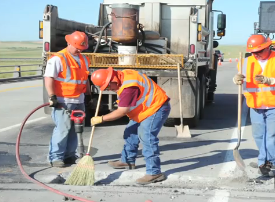Further evidence that the highway era in America is coming to a close: Under financial strain, a state DOT has stepped and up said it will stop expanding highways.
Officials at the Wyoming Department of Transportation have said the agency will turn its resources toward maintenance of its existing highways. But even without new construction, current revenues may not be enough to keep the system in good repair for long, given the fiscal crisis the agency is experiencing, according to its director.

"We're beginning to look at our transportation system from a maintenance perspective rather than [as] a highway improvement program," WYDOT Director John Cox told the American Association of State Highway and Transportation Officials.
With these changes, Cox said the agency would enter “kind of a survival mode,” but he acknowledged it only "staves off the inevitable” — the continued deterioration of the road system, unless additional funds can be found.
This is the latest sign that state DOTs are straining to provide Eisenhower-era infrastructure solutions in this new era of fiscal austerity.
Whether it's the Missouri Department of Transportation laying off 1,200 workers, or Ohio DOT Director Jerry Wray pleading for a larger federal match, these are tough times for state DOTs. Congress is two years late in passing a transportation reauthorization, the recession has crippled state budgets, the Highway Trust Fund is nearly broke, and no national politician appears to be willing to raise the gas tax. In this context, WYDOT has made a sound decision to halt big spending on road projects and concentrate on the oft-neglected work of keeping the system in a state of good repair.
Cox indicated that WYDOT needs to find new revenue sources at the federal and state levels, without, of course, broaching the topic of a gas tax. Some states, Connecticut, Maryland and potentially Michigan, are averting disaster by grabbing an increased slice at the gas pump.
Still, most agencies have yet to come to terms with the reality that the days of building massive new highways to solve every transportation problem are over. Wisconsin and Texas, both breaking the bank for highway expansions when their coffers are running dry, are some of the worst examples.
Meanwhile, at the federal level, funding has been eliminated for the Sustainable Communities Program, which aimed to reduce the need for expensive highway projects by supporting well-connected communities. New Jersey DOT helped pioneer this approach more than a decade ago, and Pennsylvania has since followed suit.
Without relief at the federal level, it's only a matter time before other states follow in Wyoming's footsteps. Who will be next?





